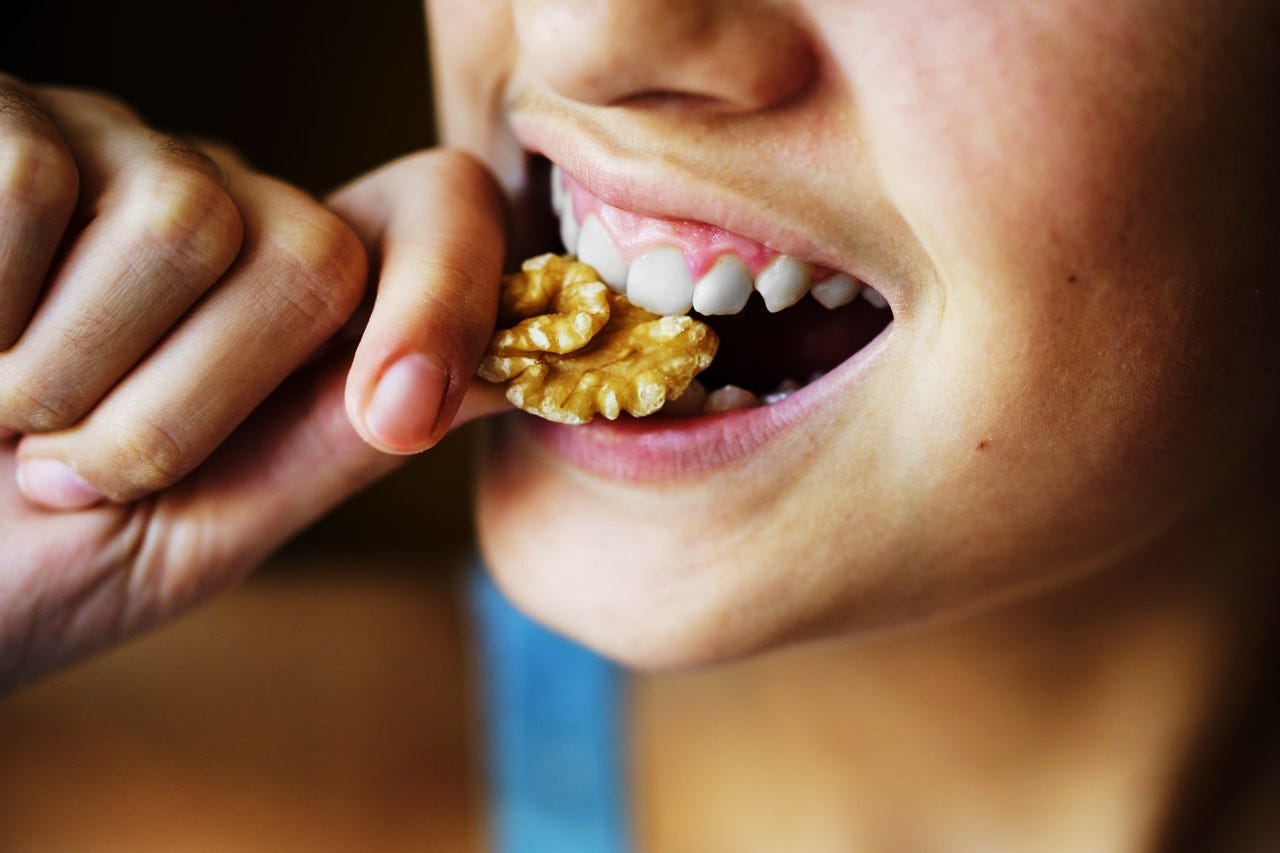Can you eat your way to good mental health?
Does what we eat really determine how we feel? Find out which habits and foods really make you happy – and can even help with depression and anxiety.

We tend to reach for sweet or fatty foods when we’re feeling bad. But the high doesn’t last much longer than the time it takes to clear the plate. And afterwards we usually feel worse than before.
And it’s no wonder, because trying to eat yourself happy requires a different approach. More and more studies show that certain types of foods and nutrients have a positive effect on our mental health – and even help prevent depression and anxiety.
How food affects our mental health
In countless self-help guides and on social media, there are more and more foods, nutrients and supplements that are supposed to improve our mental well-being. However, to understand the correlation between what we eat and our psyche, we have to start at the beginning.
Our brain controls all the processes in our body 24/7 to keep us alive. To do so, the brain sends energy to different places in the body – such as the heart so it keeps beating, the lungs so we breathe, down to the gut for digestion and through to the hormones which regulate countless processes in our body.
If the digestive tract suddenly needs more energy, the brain is less able to regulate the processes in the body. This happens, for example, if we’ve eaten extremely fatty foods that are hard to digest, when too much sugar sends our insulin levels on a rollercoaster or when we’ve quickly stuffed down a sandwich while standing and flooded our body with adrenaline.
“It’s not just about what we eat, but also about our attitude towards food and how we eat it.”
How do bacteria affect our mood?
This affects our well-being. So instead of feeling satiated, comfortable and calm, we experience unease and agitation. If this condition persists - for example, if we eat unhealthy food for a long time because we feel stressed at work or have problems in our relationship - it reinforces our negative feelings and puts pressure on our psyche.
It’s not just about what we eat, but also about our attitude towards food and how we eat it. psychiatrist and psychotherapist at the University of Fribourg. As a doctor, he has spent several years investigating nutrition and its effect on our psyche. And his latest book ”Was uns wirklich nährt” (What really nourishes us) has just been published.
His research specialises in particular on the microbiome, i.e. the bacteria in our gut. The bacterial composition in the gut differs from person to person. For example, studies show that the microbiome of a person with depression is different to that of a healthy person: “The bacteria is less diverse, which affects the mood,” says Hasler.
If the diversity of bacteria decreases, this leads to an imbalance in the microbiome. As a result, the immune system is no longer optimally stimulated, the intestine no longer only releases nutrients but also toxins into its environment and the intestinal hormones become unbalanced. This can lead to mental illness, including depression.
Communication between gut and brain
There is also increasing scientific evidence that the gut sends information directly to the brain, which also plays a role in determining how we feel. The two organs communication with each other via the gut-brain axis. Researchers don’t yet know exactly when information is passed from the gut to the brain,
but it is clear that: “The brain is a highly complex sensory organ. We now know that around 80% of information travels from the gut to the brain along the gut-brain axis and not in the opposite direction as was long thought to be the case,” says Hasler.
Foods that darken your mood
So if you want to do something good for your gut and your body and reinforce positive mental health, you need to take a closer look at what you’re eating. There are many foods that can darken your mood and lead to depression and anxiety or make them worse.
-
Too much sugar
Sugary foods such as sweet treats or simple carbohydrates (e.g. white bread) are bad for our psyche for two reasons: Firstly, sugar activates the reward system in our brain that releases the happiness hormone dopamine. So, the more sugar we eat, the less receptive our reward system is.
This leads to a vicious circle, whereby we have to eat more and more sugar to benefit from the positive effect of the dopamine. This in turn leads to weight gain and promotes diseases such as diabetes or mental illness, because those affected feel increasingly uncomfortable in their own bodies.
Secondly, sugary foods cause our insulin levels to rise rapidly in order to break down the sugar in our blood. The steeper the rise in insulin, the steeper the fall.
This insulin roller coaster means that we quickly feel hungry again and contributes to illnesses such as headaches, migraines, depression, dementia, arteriosclerosis, arthritis, kidney and eye diseases and cancer.
Feeling hungry all the time makes us feel unwell and irritable – and then we also eat more, which in turn can lead to more weight gain and mental health problems. In this state, those affected often have the feeling that they no longer have control over what they’re eating, particularly when it causes hunger pangs.
And this has a negative effect on the psyche. Those affected often feel incapable, stressed or ashamed. It is a blow to their self-esteem. And once you’ve slipped into bad habits, it’s hard to break them.
-
Ready meals and fast food
There are next to no nutrients in these foods, because they are heavily processed. All that remains is unhealthy fats, a lot of sugar, salt and preservatives. As a result our body is quickly flooded with useless nutrients, and the food doesn’t even reach the large intestine,
which is where nutrients are digested properly and healthy nutrients are extracted for use in the body. So when we eat fast food, the large intestine doesn’t get any nutrients to digest, which has negative consequences for our health.
-
Alcohol
We often drink alcohol to numb negative feelings. But the subsequent hangover leads to an emotional low, and we feel even worse than before. What’s more, studies show that even the smallest amounts of alcohol can damage the body’s cells and promote illnesses.
-
Caffeine
Coffee stimulates our nervous system, so drinking too much can lead to or increase inner restlessness, anxiety, irritability and tension. Reducing how much coffee you drink may make you feel tired at first, but in the long term it calms your nerves and mind.
-
Drink plenty
Water is essential for our well-being, so we have to drink two to three litres a day to keep our body and mind on track.
Eating habits that are good for the psyche
Certain foods affect our mood negatively, while others lift our spirits. “However, how we eat is even more important for our psyche,” says professor Hasler. For example, switching to a diet low in carbohydrates and rich in probiotics and antioxidants has a positive impact on the gut-brain axis and can improve our physical and mental health.
7 eating habits that lift the spirits:
-
Cook for yourself
Cook for yourself! Use fresh ingredients, particularly vegetables, avoid ready meals, and cut down on salt and sugar. Homemade meals are full of important nutrients for the body. If your body feels nourished, your psyche will feel the effects, too. Cooking for yourself also strengthens your relationship with food, which has been proven to have a positive influence on the psyche.
-
A balanced diet is best
Your body and mind need minerals, vitamins, healthy fats, protein and dietary fibre every day. So eat a balanced diet. Make sure you eat plenty of fresh fruit and vegetables – as many types and varieties as you can.
-
Diversity makes the difference
Try to avoid always eating the same thing. First, this makes the gut sluggish because it doesn’t have to work to break down complex nutrients from the food. And second, a lack of variety in what you eat can lead to malnutrition.
-
Be mindful of what you eat
Take time to eat – without your phone or TV. Sit down and chew consciously. Activate your sensory organs: taste and smell what is in your mouth. Feel the texture of the food. This way, eating will help you relax and enjoy the sensory experience.
This has a positive effect on your psyche, especially for people who are prone to stress eating or emotional eating. In these cases, eating serves as a distraction – to mask or calm the stress or negative trigger.
Eating quickly and without enjoyment, often means that we consume too many calories because the feeling of fullness occurs later. As a result, those affected often lose control of their eating.
This leads to a vicious circle: "Too many calories usually lead to weight gain. Coupled with the loss of control, those affected often feel a sense of shame and guilt,” says Hasler. This puts a strain on the psyche – and can lead to depression.
-
Eat together
The social aspect of eating is also beneficial for the psyche. So eat more often with friends and family. Invite guests for dinner. Taking care of others and eating together benefits mental health.
-
Mini-fasting
Start small in order to get your eating habits under control. Nutrition expert Gregor Hasler recommends mini-fasting. This means no snacking between meals. Eat breakfast, lunch and dinner. “You’ll notice that you feel better physically when you eat less calories – and that you are able to do it,” says Hasler.
This will improve your self-confidence and self-esteem. This method isn’t suitable for people who suffer from an eating disorder, as they have a compulsion to control themselves, which is exacerbated by fasting.
-
Listen to your stomach
What does hunger feel like? Many of us have forgotten to really listen to our stomach. We tend to eat at set times, even though we’re not really hungry. So you should try to listen to your stomach. Wait until you feel hungry before eating your next meal.
“Scientifically speaking, there’s still no secret recipe for a healthy psyche.”
Happy foods
Once you know which nutrients are good for your mental health, you then need to choose the right foods. However, Lang cautions: “Scientifically speaking, there’s still no secret recipe for a healthy psyche.” Lang is Director of the Clinic for Adults and the Private Clinic at University Psychiatric Clinics (UPK) in Basel.
There is still a lack of clinical evidence, but science is finding more and more proof of what is good for the psyche. For example:
-
Mediterranean diet
Studies have shown that the traditional Mediterranean diet helps against mild to severe depression. It is primarily made up of vegetables, fruit, unprocessed grains, healthy fats such as olive oil, nuts, seeds and fish – and very little meat, dairy products, processed food and sugar.
-
Good fats to brighten your mood
Our brain needs specific fatty acids so that it works properly – and thus also to control our well-being. The most important fatty acids include omega-3 and omega-6. The benefits of fish oil or the vegan substitute made of marine algae have been revealed in several studies.
In addition to other health benefits, these fatty acids increase the level of the happiness hormone serotonin. Researchers recommend eating oily saltwater fish 1 to 2 times a week or taking fish or algae oil. Nuts and avocados also contain fatty acids, but in smaller quantities.
-
Probiotics for the gut
Certain bacteria in our gut produce a range of neurochemical compounds that our brain uses to regulate physiological, mental and mood-related processes. These include messenger substances such as the happiness hormone serotonin, neurotransmitters that have a calming effect (e.g. GABA) or neuromodulators (e.g. norepinephrine) which regulate our attention, reactions and stress.
“Our most recent study shows that probiotics also have a positive influence on mood,” says Lang. “By stimulating the production of these messenger substances, probiotics help improve the cognitive skills and boost the mood of study participants.”
In the study, participants perceived faces presented with a negative expression as less threatening than test subjects without probiotics.
Probiotic foods include natural yoghurt, sauerkraut, kefir, hard cheese and gherkins.
-
Vitamins for strong nerves
Vitamin D supports the production of the mood hormone serotonin. And B vitamins are good for the nervous system and therefore the psyche. Vitamins that are good for the nerves include B1, B6, B12 and B9. B9 is better known as folic acid. It helps produce the messenger substance dopamine, which is known as a happiness hormone.
Folic acid can be found in dark green leafy vegetables, beans, peas, nuts, oranges, bananas and lemons. “Folic acid, vitamins and zinc have a positive effect on the psyche and can help lift your mood in cases of depression,” says Lang.
-
Powerful protein
The brain produces neurotransmitters to regulate thoughts and feelings. These consist of amino acids, which in turn come from protein. So it’s advisable to eat plenty of protein in every meal.
You can choose from pulses, nuts, seeds (hemp seeds in particular contain a lot of protein), dairy products, fish, eggs, cheese, lean meat or soya products.
-
Complex carbohydrates
Carbohydrates don’t have the best reputation, but they can be a real comfort food – if chosen correctly. Good sources of carbohydrates include brown rice, quinoa, millet, sweet potatoes and starchy vegetables such as lentils, peas, sweetcorn and root vegetables.
Thanks to their complex structure, the body works slower and longer to extract the starch – i.e. sugar – from food. Insulin production and blood sugar levels rise more slowly and less sharply than when we consume simple sugars such as those in white bread or sweet treats.
This gentle rise has a positive effect on our mood. Studies have shown that complex carbohydrates partially reduce the risk of anxiety.
-
Dietary fibre for the soul
Plant-based foods in particular, such as fruit and vegetables contain a lot of dietary fibre. They help the body absorb the sugar from foods more slowly. This prevents the sugar lows that we experience when we eat sweet treats, white bread, pasta or white rice as these quickly cause our insulin and blood sugar levels to spike and drop.
These lows often cause bad feelings such as irritability, restlessness and tension and can exacerbate anxiety or depression.
-
Antioxidants to reduce stress
Our immune system also has a strong influence on how we feel. If we are highly stressed over a long period of time, the body constantly releases the stress hormone cortisol. This interferes with our immune defences. As a result, the inflammation levels in the body increase, allowing more free radicals to circulate in our body, which can damage the cells.
This can lead to physical and mental illnesses or worsen anxiety and depression. Antioxidants help combat stress. They help to catch the free radicals and reduce the inflammation levels in the body.
So try to eat more berries, green leafy vegetables, turmeric and foods rich in omega-3, such as fish or chia seeds.
-
Fermented foods
Fermented foods, such as sauerkraut, kimchi and miso also have an anti-inflammatory effect – and thus boost physical and mental health.
Nutrition for depression – what should we eat?
The same dietary tips apply to people suffering from depression. “Although there is currently still a lack of scientific evidence with regard to what foods help with depression, it is very important for those affected to understand that they can actively do something for their well-being through their diet,” says psychiatrist Undine Lang.
She believes the most effective remedy is to be more mindful in life. Studies have shown that being more mindful can increase life expectancy. “You don’t have to meditate to reap the benefits, but what about taking time to cook for yourself, eat together, perhaps with friends, and focus all your senses on these moments.”

Gregor Hasler is professor of psychiatry and psychotherapy at the University of Fribourg as well as chief consultant and head of the psychiatry research department as part of the Fribourg network for psychological health. He has many years of experience as a researcher and clinician specialising in weight problems, eating disorders, stress and depression.

Psychiatrist Undine Lang is Director of the Clinic for Adults and the Private Clinic at University Psychiatric Clinics (UPK) in Basel. She is also a full professor for psychiatry at the University of Basel and has published over 200 scientific articles and several books.


